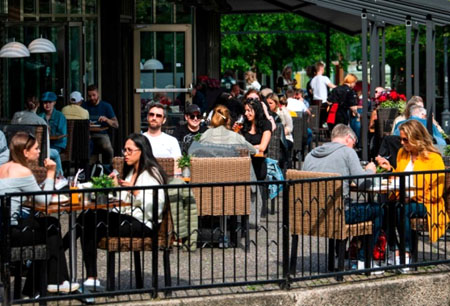by WorldTribune Staff, August 5, 2020
Sweden never went into lockdown. It doesn’t require face masks. It kept its restaurants and bars open. It kept its students in school.
Outspoken media outlets and politicians around the globe were highly critical of Sweden’s approach to the coronavirus.

But, since a surge in virus deaths in April, Sweden “has seen a remarkable turnaround,” an analyst noted.
“New daily cases are down to multi-month lows. Hospital admissions are close to zero, and just 44 Swedes died of COVID-19 in the past seven days, official numbers show. At the same time, coronavirus cases are spiking around continental Europe,” Bernhard Warner wrote for Fortune on Aug. 5.
Anders Tegnell, chief epidemiologist of Sweden’s Public Health Agency, said he feels vindicated by the covid numbers.
“The ‘Swedish model’ has become synonymous with a leave-the-people-alone approach to managing a public health crisis, a strategy advocated by small government advocates around the world,” Warner wrote.
Last week, Tegnell told reporters that masks are not necessary in Sweden. In an interview with Fortune, he doubled down on that message, saying the sustained flattening of the curve tells him to not change a thing about the country’s mask strategy — or anything else for that matter.
“We don’t have to introduce masks right now. Because, with a down-going trend,” he said, “it’s not the time to introduce new measures.”
“The mask,” he allows, “is complicated. You have to decide when to use them, who should use them, and then try to find out if will you be able to use them properly in a context. I mean, we’re talking about masks in restaurants, and, of course, you cannot eat with a mask on.” And, he pointed to Spain, which has a relatively strict mask rule but where cases have spiked lately.
He added: “I’m telling people it’s much better to keep a social distance. This is really the best thing you can do in trying to lessen the risk of [infection] — keeping distance. Try to work from home, cycle to work instead of taking the bus if you can. There are plenty of things you should do before you start with a mask [policy].”
As the coronavirus hit in the spring, Sweden opted not to close its daycare centers or schools. Tegnell told Fortune it had little bearing on infection rates. Sweden reported 1,124 cases of school-aged children contracting COVID-19 in a period spanning from March, when the outbreak began, to the close of the school year in mid-June. That number equals 2.1 pecent of all COVID cases in the country during that period. Of those, 14 had to be hospitalized in an intensive care unit.
Sweden contrasts those numbers with those of Finland. “Finland kept the schools closed, and we kept them open. And it seems like, at least in our context, it didn’t make a huge difference, neither to the pandemic, nor to the number of children falling ill,” Tegnell said.
“It seems like children do get infected,” he continued. “They very seldomly get seriously ill, and they don’t seem to spread the infection very much to other parts of the society.”
Intelligence Brief __________ Replace The Media
